- Home
- Nick Carter
The Weapon of Night Page 2
The Weapon of Night Read online
Page 2
By dinnertime the strangeness of the red lake was being commented on throughout the state of Colorado. No one could explain it.
Next day in Pocatello, Idaho, Jake Crewe crawled out of bed at 6 a.m. as always but without his usual morning cheerfulness. He had not slept well. The night had been stifling, not so much from heat as from airlessness. Not a breath of air had stirred. The atmosphere had lain heavy like some vast sleeping animal.
Jake’s barrel chest expanded as he stood at the open window trying to suck in air. Sunrise wasn’t due for another fifty-six minutes but there ought to be some sign of morning glow by now.
There wasn’t any.
A haze lay low over the town, a dirty, rank-smelling fog the likes of which he had never seen before. Not a mist, not a rain fog; just a grubby blanket of filth.
He stared at it incredulously and sniffed. Chemical odors. Auto fumes. Smoke, Sulphur, or something like it. He muttered irritably and padded to the bathroom to splash his face with cold water and wash away the feeling of being a walking lump of grime.
The smell of the water was vile.
By eight o’clock that morning nearly all of Pocatello’s thirty thousand citizens were uncomfortably aware that their city’s cool, clean air and flowing fresh water had unaccountably become contaminated.
They were not the least bit reassured to discover, later in the day, that their capital city of Boise was similarly affected. Not reassured at all.
FLAGSTAFF, ARIZONA, NOVEMBER 17 — Eighty-seven people including three engineers, one medical doctor, two airline pilots, five teachers, several dozen students, eighteen tourists and four state troopers witnessed last night’s aerial display of UFO’s near Humphrey’s Peak. Trooper Michael counted twelve “fiery balls in the sky, with tails behind them that looked like jet streams of green fire.” Dr. Henry Matheson’s camera recorded three rapid pictures of them before they “made a sudden vertical ascent and vanished over the mountains.” Today, talking to this reporter, he commented: “I’d like to see them try to explain this lot away as marsh gas.
Over Arizona’s highest peak? Not likely. Especially after that thing a couple of days ago right out in the desert. I tell you, people are getting unnerved by this kind of thing, and it’s time we took some real action before we get a state of panic . . .
EDITORIAL, KANSAS CITY MORNING SUN, NOVEMBER 10 — “After nine hours and forty-seven minutes of chaos, the lights in the Plains States came on again this morning at five thirty-five. Fourteen people died in accidents caused directly or indirectly by the power failure. Hundreds of homes were without water throughout the night. Thousands of people were stranded in their offices, on the streets, in elevators. Hundreds of thousands of residents in these four states were suddenly deprived of heat, light, comfort — and an explanation. Why did this happen again? Are we never to know? Why are the power companies unable to explain why it happened and how the situation suddenly corrected itself? We have a right to know, and we demand . . .
“Howdy, howdy, howdy, folks, Swingin’ Sammy’s back with you again to bring you all the lastest recorded hits selected especially for you by your favorite radio station, good old WROT in Tul — Wha? One moment, folks. Got a bulletin here. Hey! Flash! From the City Water Supply Commission. Water! Me, I never touch the stuff. . . . Say, maybe you better not, too. Says here — and listen carefully folks — WARNING! DO NOT REPEAT — DO NOT DRINK THE WATER FROM YOUR HOME FAUCETS, DO NOT DRINK ANY CITY WATER, DO
NOT DRINK ANY WATER IN THE AREA SERVED BY THE TAPACONIC RESERVOIR. THERE IS EVIDENCE OF UNUSUAL POLLUTION, NOT NECESSARILY HARMFUL, BUT UNTIL FINAL TESTS ARE MADE IT IS STRONGLY URGED THAT ALL RESIDENTS USE BOTTLED WATER OR OTHER LIQUIDS FROM SEALED CONTAINERS. DO NOT BE ALARMED — REPEAT — DO NOT BE ALARMED. BUT PLEASE CO-OPERATE. FURTHER DETAILS WILL BE SUPPLIED AS SOON AS AVAILABLE. Say, I thought my toothbrush tasted kinda funny this morning.”
Nick Carter stubbed out his cigarette and fastened his seat belt. The lights of New York City’s fringes lay below him and his fellow passengers, and the Eastern Airlines Constellation was already nosing downward in a graceful curve.
He looked down. It was a clear, beautiful night, and he could see the lights of Brooklyn and Long Island and the Verrazano Bridge, and he was glad to be coming home after tying up all the loose ends in Chicago.
The lights gleamed and shimmered. The runway lay ahead, a bright, inviting path.
Then it was gone.
It vanished into the night along with Manhattan, most of Long Island, parts of Connecticut and New Jersey.
There was a babble of excited voices in the plane. The pilot banked and circled and thanked his lucky stars that there were stars in the clear night sky.
Three minutes later, to the second, the lights came on again.
Millions of people, Nick among them, breathed a deep sigh of relief. But their relief was tempered by the growing suspicion that it could happen again, by the near certainty that it would happen again.
And none of them knew why.
Nick was home in his upper West Side apartment a little more than an hour later after stopping at the letter drop near Columbia University. His own address was known to only his closest friends and most of his mail traveled a circuitous route before reaching him at the drop.
He opened the letter now, rolling smooth, icy bourbon over his tongue and wondering who could be writing him from Egypt.
The letter was signed Hakim Sadek. Hakim, of course! Hakim, the cross-eyed criminologist who had used his devious talents to such astonishing effect during that business in Africa.
The memory of Hakim’s tricks made Nick grin with pleasure.
But the letter was not very funny. He read it twice, carefully, and when he put it back into its envelope his face was grim.
CHAPTER TWO
Valentina The Great
“No,” said Hawk. “And take your elbows off the toast, if you please, and pass it to me. My God, you’d think some genius in this overpriced snob trap would find some way to keep toast warm.”
Nick passed the toast. True, it was cold and soggy, but that was not the fault of the Hotel Pierre. Hawk had been on the telephone almost continually since breakfast had been brought to his suite and Nick had arrived to greet the head of AXE on his return from a top-level meeting in Europe.
“No?” said Nick. “You’ve hardly been listening to me. Why No?”
“Of course I’ve been listening to you,” said Hawk, spreading marmalade with careful lavishness. He was unaccountably irritable but he had not lost the frontiersman’s appetite that somehow left him looking lean and wiry and leather-tough. “Anyway, I know all about it. Blackouts here, pollution there. Lakes that turn bright red and water that flows stinking from the faucets. Oh, even in Europe I heard all about it. Humph. I see by this morning’s papers that flying saucers were seen over Montauk again last night. Extremely sinister, without a doubt.” He attacked his scrambled eggs and concentrated on them for a while. Then he said, “Don’t think I haven’t been concerned. Discussed this with the Chief on the four-way system Wednesday night. Central thinks it’s mass hysteria due to Vietnam war nerves, precipitated by perfectly normal incidents that just happen, coincidentally, with rather more than normal frequency. People exaggerating things, putting two and two together and coming up with with forty-five. The Bureau says —”
“It’s more than two and two,” said Nick. “Even more than forty-five.”
“Die Bureau says,” Hawk repeated, giving Nick a beady stare, “that it is quite impossible for enemy agents to have been at work. All incidents may be ascribed to human error, mechanical malfunctioning, self-delusion and imagination. However, they warn us that we must not entirely overlook the possibility that Russian saboteurs are lurking in our midst. Witness the red lake, for one thing.” Hawk smiled a little sourly. “That one really hit J. Egbert where he lives. But he will be Alert, he said, and Ever-Watchful.”
He took a mouthful of coffee and made a face. “Pre
tty bad, at a dollar a cup. Pfui. Well. McCracken took a middle course between two middle courses, which is walking a fine line indeed. He subscribes to the theory that all these episodes can be easily explained, though he himself cannot explain them. Power failures have been common enough for decades. We all know that smog and pollution came to us with the machine age. And we also know, he says, that there is a psychological factor involved — that things of this sort come in waves, like suicides and airplane crashes and so on. It will pass, he says. Due to our national state of nerves — again, I quote him — the American people are lumping a whole lot of unrelated incidents together and inducing in themselves a state of semipanic. But just in case — and here he goes along with J. Egbert — we must maintain an attitude of vigilance. The Chief agreed. So. All state and local police will make extra efforts to investigate all such phenomena. Federal marshals will be sent wherever necessary and the National Guard has already been alerted in order that they may act in extreme cases. The FBI, as promised, will be Alert and Ever-Watchful. But we of AXE have been ordered to keep our noses out of it. Out. And that, Carter, is that.”
“Is it?” Nick said thoughtfully. “Pity. But I have one small trump card up my sleeve —”
“Keep it there!” Hawk snapped. “Unless you have concrete evidence of foreign instigation and a pretty good idea of where and how to start investigating. Do you?”
Nick shook his head. “I don’t. Nothing but suspicion.”
“I have that myself,” said Hawk. “And that’s all I have.” He took a deep draught of cooling liquid from his coffee cup, and his leathery face twisted into a grimace as he pushed the cup away. “Filthy stuff,” he growled.
“Made from the world’s best coffee beans and the world’s worst water,” Nick observed. “New York’s very own. With a pollution content higher than it’s ever been. Nonpoisonous, they tell us, but revolting to the taste. I wonder why?”
“That’s enough, Carter,” Hawk said coldly. “Subject closed. Even if you were free to go off on a wild-goose chase I wouldn’t waste your time that way. And you’re not free.
Starting tomorrow morning, you will be on escort duty until further notice.”
“Escort duty?” Nick said incredulously. That meant doing snoop patrol with some V.I.P. from a Communist or “uncommitted’ nation, and he did not care for the idea. He had not earned his title of Killmaster by conducting guided tours.
Hawk favored him with a thin smile. “It may prove to be more interesting than you think. What do you know about the nuclear fuel plant in West Valley, New York?”
Nick cast his mind back to the appropriate memory file. “Owned and operated by Nuclear Fuel Services,” he said. “It’s the first — and so far, the only — commercial nuclear-fuel reprocessing plant on American soil. It produces pure plutonium of the type used to make nuclear bombs, but not for military purposes — only for powering peaceful nuclear reactors. West Valley’s about thirty-five miles south of Buffalo, which puts it close to Lake Erie and not too far from the Canadian border.” He wrinkled his brows and reached slowly for a cigarette. “Not too far, in fact,” he said thoughtfully, “from the source of the “sixty-five Northeastern blackout. Never thought of that before — Yes, that is interesting.”
Hawk sighed. “Forget it, Nick,” he said tiredly. “Forget about the blackout angle. The point about the plant is this: It’s open to the public, on a prearranged basis. And not just the American public. To members of the International Atomic Energy Agency, to qualified scientists from friendly countries and to various foreign brass hats who qualify for other reasons. The idea is to share our knowledge for peaceful purposes. Now, it happens that we owe a courtcsy — a very large favor, in fact — to a certain governmental department in the U.S.S.R.” He looked at Nick quizzically and the lines deepened at the corners of his eyes. “To Russian Intelligence, in fact. They have arranged, through the highest channels, to send a representative to inspect the West Valley plant.”
“Russian Intelligence,” Nick said flatly. “Now I’ve heard everything. And my job is to see that he doesn’t go poking where he isn’t supposed to poke. Oh, fascinating.”
“Yes, that’s the job,” Hawk admitted. “It’s a little unusual, of course, but for various reasons we couldn’t turn down their request. You won’t find it unpleasant, I’m sure. They’re ending Valentina Sichikova.”
Nick’s face brightened. “Valentina! Girl of my dreams, love of my life! You’re right — that does cast a slightly different light on things. But how come they picked her?”
Hawk leaned back and bit the tip of[ one of his air-polluting cigars.
“Because you two know each other,” he said. “Because they wanted to send someone we can trust. I myself do not, as you know, trust anyone, but as long as they had to choose someone it might as well be her. I’ve engaged a suite of rooms for her on the twenty-third floor and a smaller one for you directly opposite. I don’t need to tell you that, trust her or not, she must be watched at all times. She’s a brilliant woman and there might just be more in this than meets the eye. So you will treat her royally and watch her like a — ah, hawk.” He reached into his briefcase and pulled out a folded sheet of paper. “You might care to read this letter from Smirnov, which reached me through State. He was the one who chose Sichikova for this visit. He took this opportunity to write us something in the nature of a fan letter for our part in that Moscow bugging affair. Very laudatory and fulsome. It might amuse you.”
Nick read it. Dmitri Borisovich Smirnov was indeed lavish in his praise for Hawk’s department. But seemed sincere, and he earnestly requested that the man he knew as Tom Slade should be Comrade Sichikova’s escort. As head of Russian Intelligence, he was only too aware that the Comrade’s visit might cause suspicion in some quarters, but he was sure that Hawk and “Slade’ would handle the situation with their usual delicacy . . . and so on and so on and so on, with lots of compliments and wishes for good health.
“Very nice,” Nick commented, handing it back. “A bit pretty for your tastes, I know, but I would say that friend Dmitri means it all.” He squinted thoughtfully at Hawk, thinking about something that had nothing at all to do with Valentina or her superior officer.
Hawk stared back at him. “Well?” he demanded. “What’s on your mind?”
Nick reached into his pocket and drew out a letter of his own.
“I get fan mail, too,” he said, almost idly. “You recall Hakin, of Egypt and Abimako?”
Hawk nodded. “I do,” he said crisply.” So?”
“This reached me through the drop,” said Nick. “I always thought Hakim was a born AXEman and I left him with the means of getting in touch with me. I’ve had a couple of newsy letters in the past year or two. And now this. Thought it might intrigue you.”
Hawk took the letter. He frowned as he read.
It said:
Dear Nicholas,
A quick note before I go to the classroom and begin part seven of my course in the Seven Lively Arts. Details will follow at your request, but at this stage I do not wish to inflict upon you too much of what you may regard as trivia. Yet, I have encountered something which caused my crime-sniffing nose to twitch and my eyes to cross swords even more valiantly than usual, and I thought at once of you and your own talent for sniffing out the odd and apparently inexplicable.
Last night I attended a dreary off-campus party in honor of some even more dreary on-campus individual. I arrived late, deliberately, for I have no patience with those affairs, and when I got there the wine was flowing indiscriminately and tongues were flapping. To my great disgust I was buttonholed immediately by Doctor Wilhelm von Kluge of the College of Medicine, who proceeded at once to bore me with his miraculous exploits in the medical field. Then all at once he ceased to bore me. Soon he became almost as cross-eyed as I myself and the words spilled from his mouth. He is a surgeon, I must tell you, brought to Egypt by our estimable Nasser, and it was when he began talking of his recent
carvings that I pricked up my ears and listened.
It seems that he is an expert in cosmetic surgery, a fact that he had not previously confided to me. It further seems that, over the course of the past few months, he has been doing a series of operations to alter the facial characteristics of a number of men who paid him vast sums of money for his skills. His greatest triumph, professionally speaking, was in the area around the eyes, and in the hormonal inducement of hair growth where hair was reluctant to appear before. In the course of his babblings it emerged that none of these men — some eight or nine in number, so far as I could gather — was disfigured in any way so that they actually required surgery. They merely wished to alter their appearance, and according to him he did so with unparalleled brilliance. I got the impression from him, though he did not say so directly, that they all knew each other and that the treatment of each was very similar. Some required more or less work on the nose; one or two demanded his greatest skill in the transformation of the cheekbones. But on the whole their requirements were the same.
I then asked him — as who would not? — exactly what they had looked like before. And then, my friend, he most regrettably clammed up, as you would say, and began talking very rapidly about something else. Nothing I could do or say would bring him back to discussion of his surgical brilliance. Yet, I thought I saw him glance around the room with a kind of nervousness, and, soon after that, he left.
I see that, as usual, my “quick note’ has become a chapter, and in it I have offered you nothing but intangibles. But I find they interest me strangely, and I shall pursue the matter. I see, too, that it approaches the hour for me to lecture to my budding crime-fighters, so I will leave you with this little puzzle.
The term will soon be over — Allah be praised for my criminologist’s holiday. You do not propose to vacation in Egypt this year? Alas, I thought not. But write me at your leisure and tell me what you think of von Kluge and his drunken ravings. In the meantime, my best greetings —

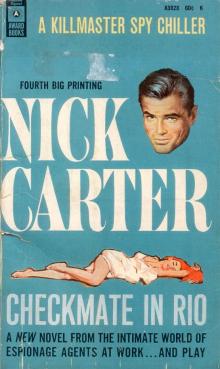 Checkmate in Rio
Checkmate in Rio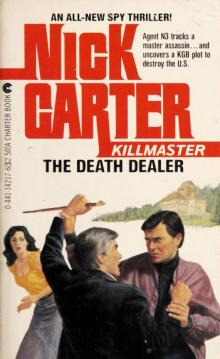 The Death Dealer
The Death Dealer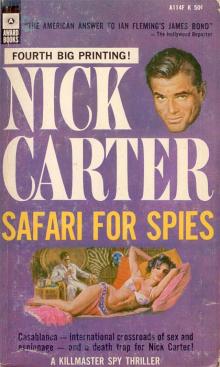 Safari for Spies
Safari for Spies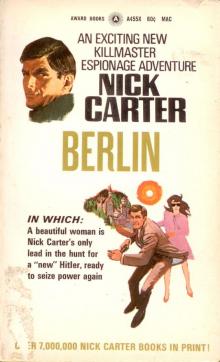 Berlin
Berlin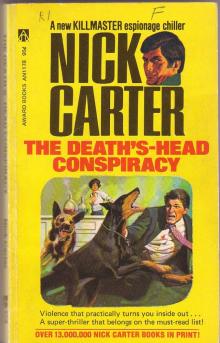 The Death’s Head Conspiracy
The Death’s Head Conspiracy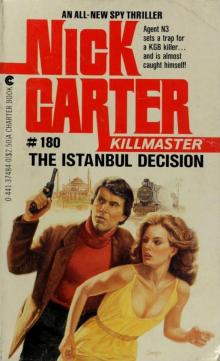 The Istanbul Decision
The Istanbul Decision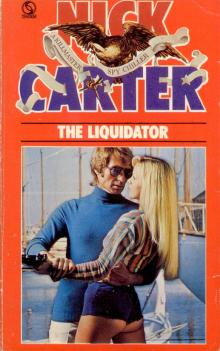 The Liquidator
The Liquidator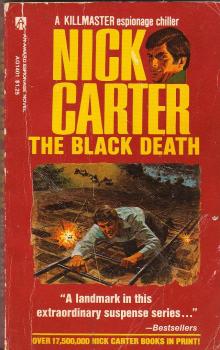 The Black Death
The Black Death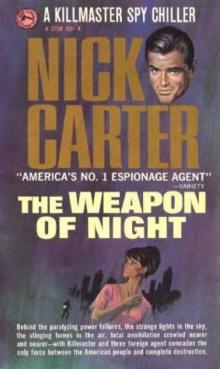 The Weapon of Night
The Weapon of Night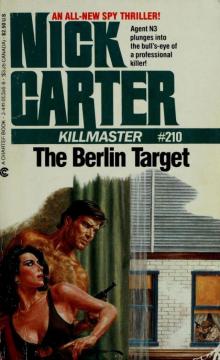 The Berlin Target
The Berlin Target Temple of Fear
Temple of Fear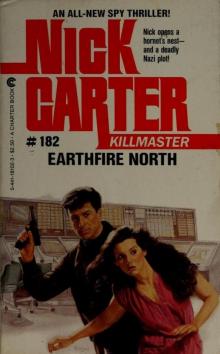 Earthfire North
Earthfire North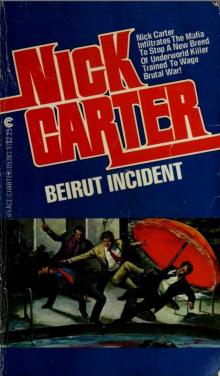 Beirut Incident
Beirut Incident White Death
White Death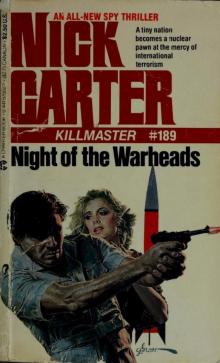 Night of the Warheads
Night of the Warheads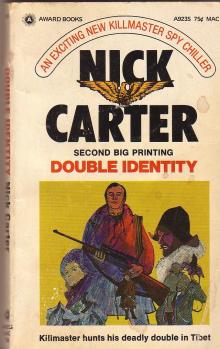 Double Identity
Double Identity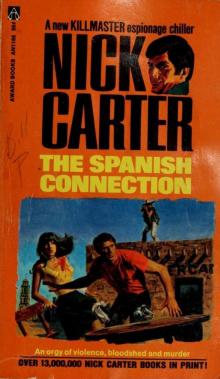 The Spanish Connection
The Spanish Connection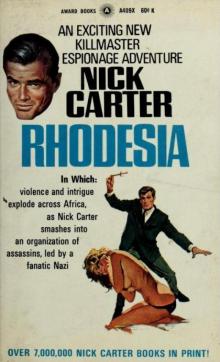 Rhodesia
Rhodesia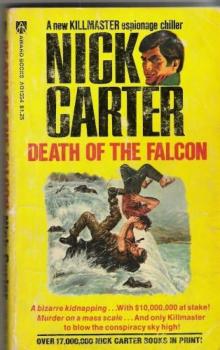 Death of the Falcon
Death of the Falcon The Executioners
The Executioners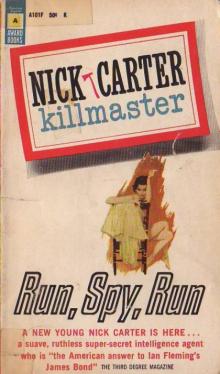 Run, Spy, Run
Run, Spy, Run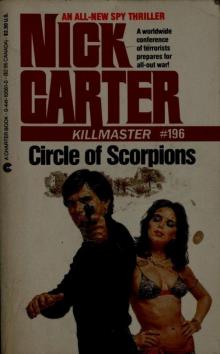 Circle of Scorpions
Circle of Scorpions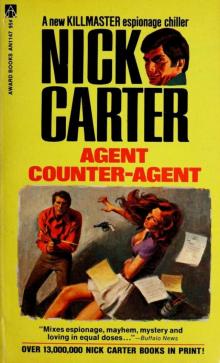 Agent Counter-Agent
Agent Counter-Agent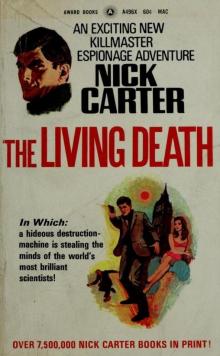 The Living Death
The Living Death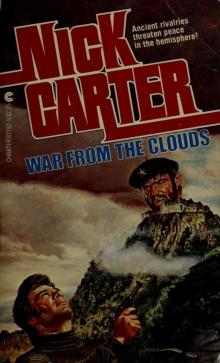 War From The Clouds
War From The Clouds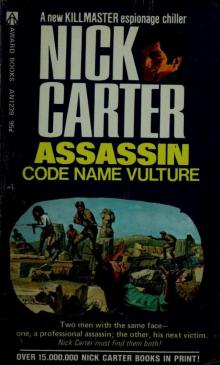 Assassin: Code Name Vulture
Assassin: Code Name Vulture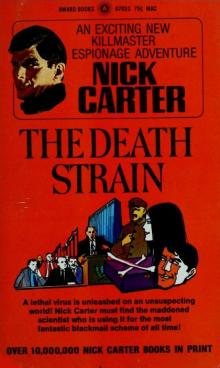 The Death Strain
The Death Strain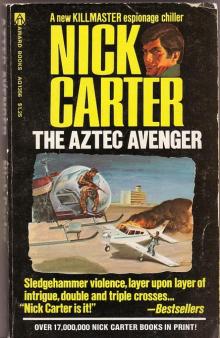 The Aztec Avenger
The Aztec Avenger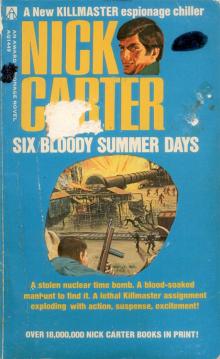 Six Bloody Summer Days
Six Bloody Summer Days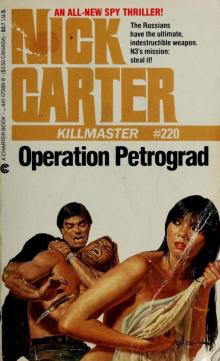 Operation Petrograd
Operation Petrograd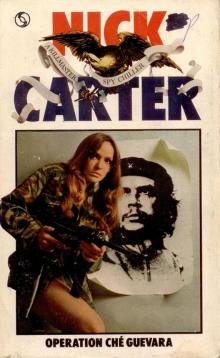 Operation Che Guevara
Operation Che Guevara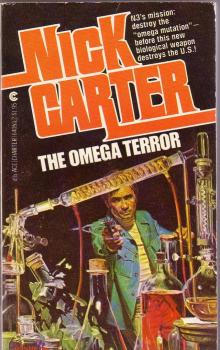 The Omega Terror
The Omega Terror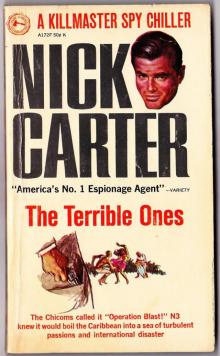 The Terrible Ones
The Terrible Ones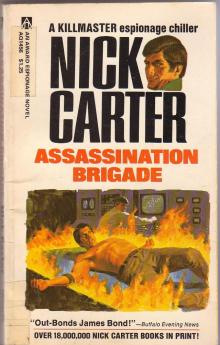 Assassination Brigade
Assassination Brigade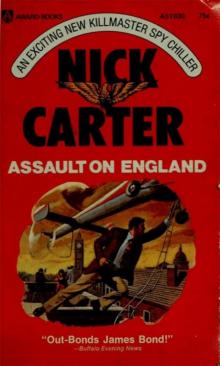 Assault on England
Assault on England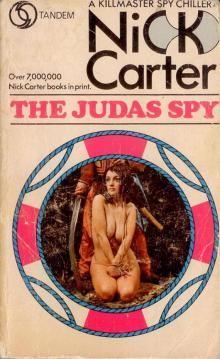 The Judas Spy
The Judas Spy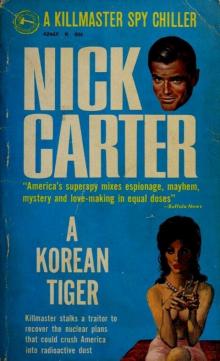 A Korean Tiger
A Korean Tiger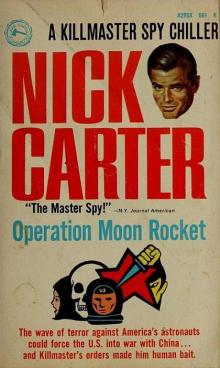 Operation Moon Rocket
Operation Moon Rocket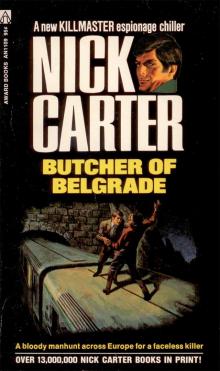 Butcher of Belgrade
Butcher of Belgrade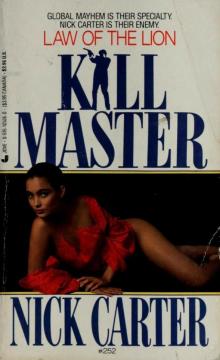 Law of the Lion
Law of the Lion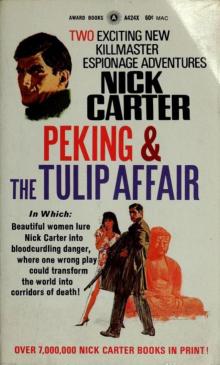 Peking & The Tulip Affair
Peking & The Tulip Affair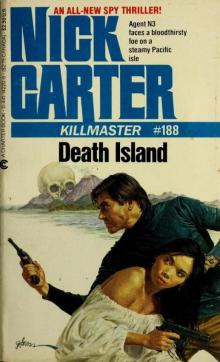 Death Island
Death Island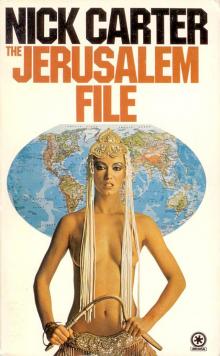 The Jerusalem File
The Jerusalem File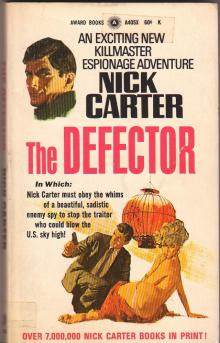 The Defector
The Defector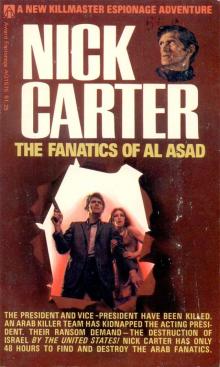 The Fanatics of Al Asad
The Fanatics of Al Asad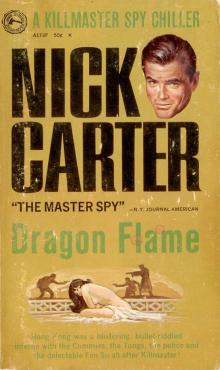 Dragon Flame
Dragon Flame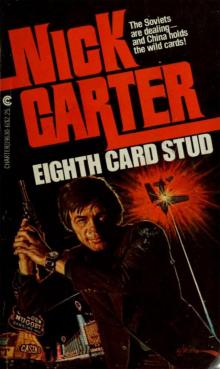 Eighth Card Stud
Eighth Card Stud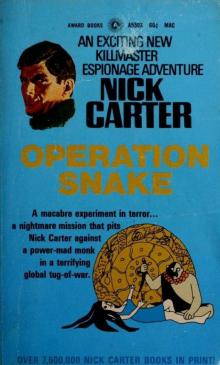 Operation Snake
Operation Snake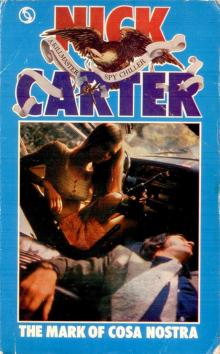 The Mark of Cosa Nostra
The Mark of Cosa Nostra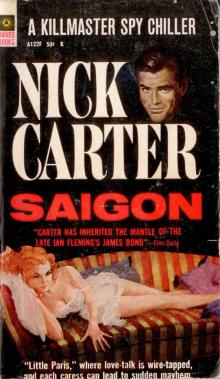 Saigon
Saigon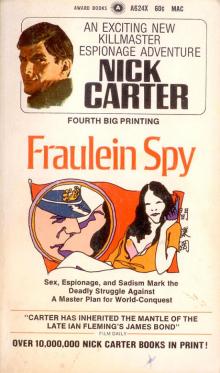 Fraulein Spy
Fraulein Spy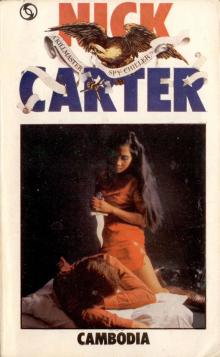 Cambodia
Cambodia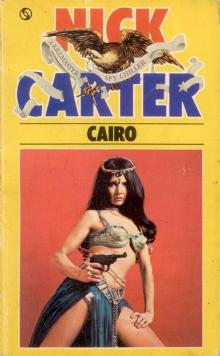 Cairo
Cairo